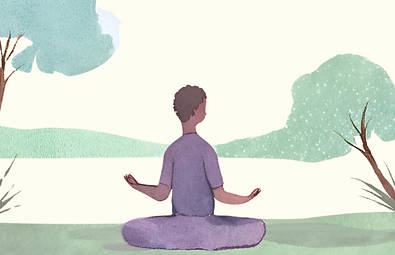What is Meditation?
Meditation is an umbrella term for the tools and techniques utilized in order to first realize, and subsequently return to, our deepest nature of pure awareness and experience its inherent peace.
Meditation is practiced in numerous religious traditions and plays an important role in Hinduism, Jainism and Buddhism, but since the 19th century, Asian meditative techniques have spread to other cultures where they have also found application in non-spiritual contexts, such as business and health.
Research from health and science institutions exploring the many benefits of meditation show that a regular meditation practice may significantly reduce stress, anxiety, depression, and pain, as well as enhance ones sense of peace, self-concept, and well-being.
Learn More about Mindfulness
Let’s answer some frequently asked questions regarding mindfulness and meditation.
What exactly is mindfulness?
In one word, mindfulness is awareness. Remember the last time you sat by a fire, feeling calm and peaceful as you watched the flames dance? That experience is mindfulness—a state of pure, present-moment awareness. This awareness can be cultivated through practices like mindfulness meditation, allowing us to experience our inherent peace and well-being.

Can mindfulness cure my stress?
Mindfulness isn’t about curing; it is about cultivating a new relationship with our thoughts and emotions. Stress is a normal part of life, just like happiness, sadness, anger, and joy. Mindfulness teaches us to become aware of the thoughts and emotions we are experiencing in the present moment so that we may respond to them and the situation around us in an intentional, rather than reactive manner.
Are mindfulness and meditation spiritual?
The word spiritual originates from the Latin word spiritus, meaning “breath” or “spirit”. Over time, the word spiritual has broadened in meaning to encompass ideas related to an inner life, personal beliefs, and non-religious approaches to connecting with self, others, or the world on a deeper level. The practices, like breathing, are universal and secular; however, how we finds meaning in anything is up to us!
Why should I meditate?
All of us - whether conscious of it or not - are seeking contentment, or what could be called lasting peace and happiness. We try to attain it through objects, substances, relationships, places, achievements, etc., but we come to realize it can't be found through experiences of the world. Once we become aware that nothing experienced can bring us the lasting peace we seek, we begin to look in the only remaining direction, within! Thus, we have begun to meditate. Meditation is the tool we use in order to rest as our peaceful nature.
Is mindfulness the same as meditation?
I like to describe meditation is the action which leads towards a state of simple, present moment awareness that we call mindfulness. The meditation aspect is about carving out time to cultivate mindfulness in a formal, intentional way. The “real practice” then becomes life itself, as we integrate mindfulness into more and more aspects of our daily lives.

What does the science say?
There are countless scientific studies to show how mindfulness practices are correlated with changes in the brain related to a multitude of positive psychological effects. Meditation may significantly reduce stress, anxiety, depression, and pain, and enhance peace, perception, self-concept, and well-being. It is this scientific evidence that has led to medical professionals recommending mindfulness to patients the world over. (More Below)
Benefits of Meditation
Stress Reduction
Reduce stress by promoting relaxation and calming the mind. Regular practice can lead to lower levels of the stress hormone cortisol.
Improved Relationships
Meditation fosters qualities such as compassion, empathy, and patience. Practitioners often find that their interpersonal relationships benefit as a result of enhanced emotional intelligence.
Improved Focus & Concentration
Meditation helps train the mind to focus on the present moment, leading to improved concentration in daily tasks.
Increased Self-Awareness
Meditation cultivates self-awareness, allowing individuals to observe their thoughts and emotions without judgment. This self-reflection can lead to a greater understanding of oneself and one's behavior.
Enhanced Emotional Well-being
Meditation can contribute to a positive emotional state by encouraging a more balanced and mindful approach to emotions.
Improved Physical Health
Meditation has been associated with: lower blood pressure, better management of chronic pain, better sleep, and structural brain changes associated with learning, memory and emotional regulation.
